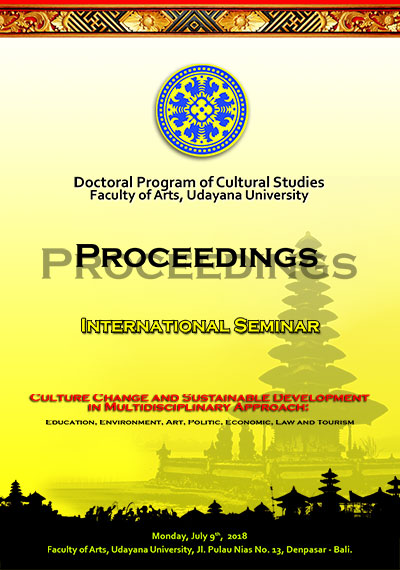REINTERPRETATION OF THE CIRCLE OF LIFE OF KARO PEMENA SOCIETY
Abstract
This article discusses about the rites process undertaken by the Karo Pemena community in living the cycle of life from birth to death. Also examines the moral values that influence the cosmic order and the socio-cultural environment of a harmonious, pre-colonial society. This article uses the post-colonial perspective by Said. The study of postcolonialism was used to dismantle the dominance of Western thought in assessing the Eastern culture. The method used in this article is a method of hermeneutics to learn and find the meaning contained in the object of research in form of the phenomenon of human life, through understanding and interpretation. The purpose of this method is to open the essential and philosophical meaning derived from the symbols of the community of Karo Pemena. This article concludes the existence of the religion of Pemena began to decline in the political domination of the Dutch colonial government in Tanah Karo. The zending politics of Dutch has ruined the Karo Pemena until finally leaving the religion and affecting their socio-cultural system. Through the process of meaning, philosophical values in the cycle of life stages can be applied in Karo society according to the spirit of ethnic identity in post-colonial studies.
Downloads
References
Durkheim, E. 2017. The Elementary Forms of The Religious Life (terjemahan). New York: Free Press. Kaelan, H. 2012. Metode Penelitian Kualitatif Interdisipliner. Yogyakarta: Paradigma. Leonard, P. 2005. Nationality Between Poststructuralism and Postcolonial Theory. A New Cosmopolitanism: New York: Palgrave Macmillan. ISBN 1-4039-1912-7.
Lubis, A.Y. 2015. Pemikiran Kritis Kontemporer. Jakarta: PT. RajaGrafindo. ________. 2006. Dekonstruksi Epistemologi Modern Dari Posmodernisme, Teori Kritis, Poskolonialisme, hingga Cultural Studies. Jakarta: Pustaka Indonesia Satu.
Lubis, N. A. F. 2001. Pengantar Filsafat Umum. IAIN Press: Medan. ISBN: 979-95582-7-1. Palmer, R.E. 2005. Hermeneutika: Teori Baru Mengenai Interpretasi (terjemahan). Yogyakarta: Pustaka Pelajar. ISBN: 979-3477-17-2.
Prinst, D. 2004. Adat Karo. Medan: Bina Media Perintis. Putro, B. 1979. Karo dari Zaman ke Zaman (Jilid I). Medan: Ulih Saber. Sebayang. V. A. 2013. “Analisis Interrelasi Guru Sibaso, Musik, dan Trance dalam Upacara Ritual Erpangir Ku Lau pada Masyarakat Karo” (Tesis). Program Studi Magister (S2) Penciptaan dan Pengkajian Seni, Fakultas Ilmu Budaya, Universitas Sumatera Utara. Medan.
Sibeth. 1990. The Bataks. NN. Tamboen. P. 1952. Adat Istiadat Karo. Djakarta: Balai Pustaka. Tarigan. H. G. 1990. Percikan Budaya Karo. Bandung: Yayasan Merga Silima. Ahmad. T. A. “Membedah Pemikiran Arnold J. Toynbee”. (Posted on Sunday, May 10th 2009 ; Date of Access: Saturday, September 16th 2017).





